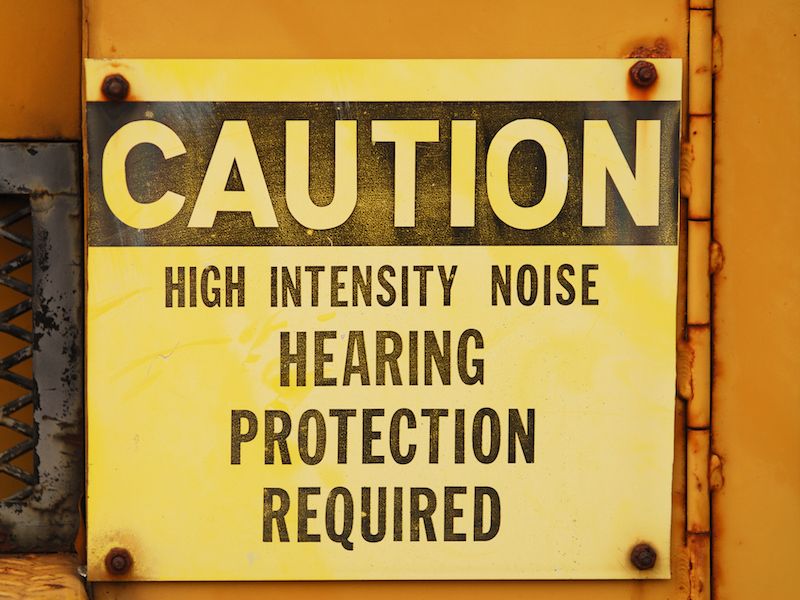
Realizing you should protect your hearing is one thing. It’s another matter to know when to safeguard your ears. It’s more difficult than, let’s say, knowing when you need sunblock. (Are you going outside? Is the sun out? You should be wearing sunblock.) It isn’t even as simple as determining when to use eye protection (Using a hammer? Working with a saw or dangerous chemicals? Use eye protection).
When it comes to when to wear hearing protection, there seems to be a big grey area which can be dangerous. Usually, we’ll defer to our normal inclination to avoid hearing protection unless we’re given information that a specified activity or place is dangerous.
Risk Evaluations
In general, we’re not very good at assessing risk, especially when it comes to something as intangible as lasting hearing problems or loss of hearing. Let’s take some examples to demonstrate the situation:
- A very loud rock concert is attended by person A. The concert lasts around 3 hours.
- Person B owns a landscaping business. She spends a significant amount of time mowing lawns, then she goes home to a quiet house and reads a book.
- Person C is an office worker.
You may think that person A (let’s call her Ann, to be a little less clinical) may be in more hearing danger. Ann leaves the concert with ringing ears, and she’ll spend most of the next day, trying to hear herself speak. It seems rational to presume that Ann’s recreation was rather risky.
The noise that person B (let’s just call her Betty), is subjected to is not as loud. There’s no ringing in her ears. So it has to be less hazardous for her hearing, right? Well, not really. Because Betty is pushing that mower all day. Actually, the damage accumulates a little bit at a time even though they don’t ring out. If experienced too often, even moderately loud noise can have a negative affect on your hearing.
What’s going on with person C (let’s call her Chris) is even more difficult to sort out. Most people understand that you should safeguard your ears while running machines such as a lawnmower. But even though Chris works in a quiet office, she has a very noisy, hour-long commute each day through the city. In addition, she sits behind her desk and listens to music through earbuds. Does she need to think about protection?
When is it Time to Start to Think About Safeguarding Your Hearing?
Normally, you should turn the volume down if you have to raise your voice to be heard. And if your environment is that noisy, you really should consider wearing earplugs or earmuffs.
If you want to think about this a bit more scientifically, you need to use 85dB as your limit. Sounds above 85dB have the capacity, over time, to result in damage, so you need to consider wearing ear protection in those circumstances.
Most hearing specialists recommend using a special app to monitor decibel levels so you will be aware when the 85dB has been reached. You will be able to take the correct steps to protect your ears because these apps will inform you when the noise is reaching a hazardous level.
A Few Examples
Your phone may not be with you wherever you go even if you do get the app. So we may formulate a good baseline with a couple of examples of when to protect our hearing. Here we go:
- Listening to music with earbuds. OK, this doesn’t require protection but does require care. Pay attention to how loud the music is, how long you’re playing it, and whether it’s going directly into your ears. Noise-canceling headphones are a good choice to steer clear of having to turn the volume way up.
- Commuting and Driving: Do you drive for Lyft or Uber? Or perhaps you’re just hanging around downtown for work or getting on the subway. The constant noise of living in the city, when experienced for 6-8 hours every day, can cause damage to your hearing over the long term, specifically if you’re cranking up your music to hear it over the din.
- Exercise: You know your morning cycling class? Or even your evening yoga session? Each of these examples could require ear protection. The loud volume from trainers who play loud music and microphones for motivation, though it may be good for your heart rate, can be bad for your hearing.
- Operating Power Tools: You recognize that working every day at your factory job is going to require hearing protection. But how about the hobbyist building in his workshop? Most hearing specialists will suggest you use hearing protection when using power tools, even if it’s only on a hobbyist basis.
- Domestic Chores: Even mowing the lawn, as previously mentioned, necessitates hearing protection. Cutting the grass is a great illustration of the kind of household chore that might cause harm to your ears but that you probably don’t think about all that often.
These examples may give you a suitable baseline. When in doubt, though, you should defer to protection. Rather than leaving your ears exposed to future damage, in most instances, it’s better to protect your hearing. Protect today, hear tomorrow.